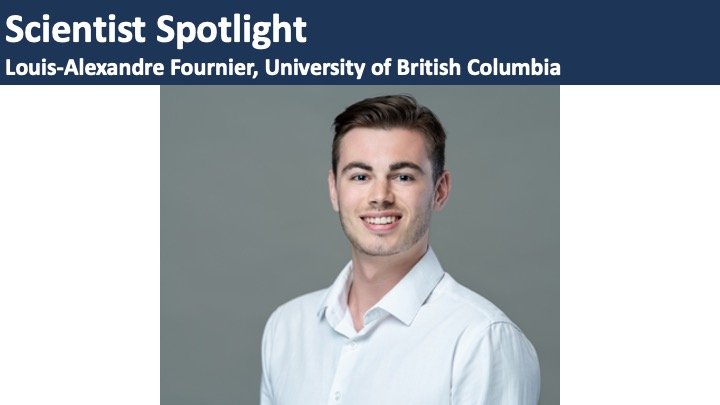Louis is originally from Quebec City and obtained his BSc. in Microbiology and Immunology from McGill University in 2017. He joined the Stirling lab the same year to complete his PhD, where he uses CRISPR screening to uncover genetic dependencies of ARID1A-deficient cancers. He hopes to graduate before the end of the year. Outside of the lab, Louis likes to spend time outdoors with his dog and fiancée, go on bike rides and try out new coffee shops.
Can you tell us more about your research?
ARID1A is a gene that is mutated in about 8% of all cancers. ARID1A is a subunit of a larger protein complex that functions in the regulation of DNA organization within the cell, which affects a variety of cellular processes including the expression of genes into proteins. Despite an increasing body of knowledge on the consequences of ARID1A mutations in cancer, there remains no effective way of selectively killing cancers cells harboring these mutations. My thesis work aims to identify vulnerabilities of cancer cells that are mutated for ARID1A. To do so, I have implemented a large-scale gene editing approach within our lab to identify genes that become essential for cell survival when ARID1A is mutated. This method allowed me to identify new therapeutic targets to selectively kill cancer cells and improve current treatments of ovarian cancers.
Where are you from? What do you miss about your hometown/country?
I am from Quebec City, Canada. What I miss the most from home is family/friends and the summer music festivals.
What city do you currently live in and what do you like most about this city?
I currently live in Vancouver, Canada. What I enjoy the most here is the mountains, green spaces, and the ocean. The mild winters are also a nice perk!
What are some ways you detach from work/science/academia?
Outside of work/science, I like to be physically active (running, cycling, skiing, etc.). I find that exercise is often energizing and almost meditative. I also enjoy hiking with my fiancée and my dog, as well as socializing with friends and trying out new coffee shops.
Do you have any special talents outside of research that few people in your academic life know about?
I consider myself a relatively good cook. It probably helps that following a recipe or scientific protocol require similar skills…
Do you have a recommendation for a book, tv show, movie or documentary?
“How to build a car” by Adrian Newey is a fantastic book exploring the innovative process of designing successful F1 cars. “Advice for a young investigator” by Santiago Ramón y Cajal is also a great book for aspiring scientists.
What made you decide to become a researcher?
At a young age, I was introduced by my grandfather to the intricacies of human biology through the lens of his microscope. This curiosity for human biology eventually led me into research.
If you wouldn’t be a researcher, what would you like to be/think you would be?
Probably a mechanical engineer (I’m fascinated by F1 cars) or a carpenter (I like to work with my hands).
What sparked your interest in epigenetics?
I’ve always been amazed at the fact that human cells share the same genetic material, yet there is incredible diversity in the cell types that the body produces. It is incredibly interesting to me that modulating DNA organization can result in such diversity.
If you could give your “first-year-PhD-self” one advice, what would it be?
Three things: 1) Pace yourself – it’s a marathon, not a sprint. 2) Embrace failure – it provides opportunity to learn. 3) Have fun and be curious!
Where would you like to see your research/field of interest end up in the future?
One thing that my program has taught me is the importance of interdisciplinary collaborations. With the generation of large datasets becoming the standard, approaching complex problems from different perspectives is crucial to extract the most out of the data. As such, I hope that the field approaches problems from different angles through collaborations.

